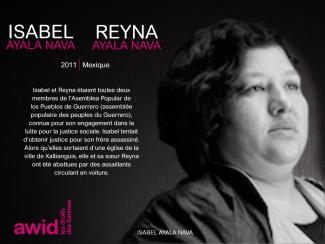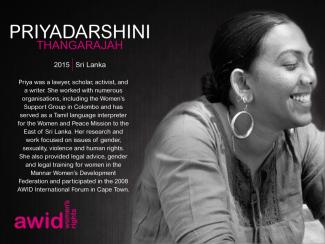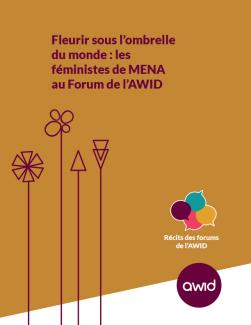Política de privacidad de AWID, tus derechos a la privacidad y las cookies
Esta política rige para todas las páginas alojadas en https://www.awid.org/ y para cualquier otro sitio web bajo el control de AWID (el «Sitio web») y para las suscripciones a estos sitios. No se aplica a páginas alojadas por otras organizaciones distintas a AWID, hacia las cuales podemos dirigir un hipervínculo y cuyas políticas de privacidad pueden ser diferentes. Por favor, lee la siguiente política para que puedas comprender nuestra política de privacidad en cuanto a su naturaleza, propósito, uso y divulgación de tu información personal e identificable que es recogida a través de este sitio web.
1 Tipos de información recogidos en este sitio:
En general, puedes navegar este sitio web sin enviarnos información personal. Sin embargo, en algunas circunstancias, te pediremos esa información personal.
1.1 Información que nos brindas
Cuando te encuentras en el sitio web y se te pide información personal, estás compartiendo esa información sólo con AWID.
1.1.1 La información que nos das para recibir actualizaciones de AWID:
Cuando te registras para usar el sitio (por ejemplo, te suscribes para recibir correos electrónicos o para solicitar membresía) nos das la información necesaria acerca de ti, como tu nombre, país, idioma, para recibir actualizaciones por correo electrónico. Nos das esta información a través de formularios seguros y es almacenada en servidores seguros.
1.1.2 La información de pago que nos das para hacerte miembrx o para anotarte en algún evento:
Además, puede ser necesario que nos des información sobre el pago cuando te haces miembrx o cuando te anotas para eventos. AWID no almacena en sus servidores ninguna información relativa a tarjetas de crédito y usa portales seguros para procesar la información relativa a pagos.
1.1.3 La información opcional que decidiste darnos (con consentimiento)
Cuando te comunicas con AWID o nos das información opcional a través de formularios en el sitio web o utilizas el sitio para comunicarte con otrxs miembrxs, recogemos información sobre tu comunicación y cualquier otra información que elijas dar.
1.1.4 Información que nos das a través de los formularios de contacto o cuando te comunicas directamente con nosotrxs
Cuando te comunicas con nosotrxs, recogemos tu comunicación y toda otra información que decidas darnos.
1.2 Información que es recogida automáticamente (cookies de tercerxs):
Además, cuando interactúas con el Sitio web, nuestros servidores pueden llevar un registro de actividad que no te identifica personalmente («Información no personal»). Por lo general, recogemos las siguientes categorías de información no personal:
- Podemos recoger ciertos datos demográficos, como año de nacimiento o género, como parte de la recolección de información personal;
- Recolectamos y guardamos cierta información sobre tu computadora, teléfono móvil u otro aparato que uses para ingresar al Sitio web. Esta información puede incluir la dirección de IP, la información de geolocalización, identificadores únicos del aparato, tipo de navegador, idioma del navegador y otra información transaccional;
- Automáticamente registramos cierta información de tu uso del Sitio web. Esta información incluye el historial de las páginas que viste. Usamos esta información para darte una experiencia más personalizada en el Sitio web;
- Recogemos y almacenamos «datos de tráfico» adicionales, como la fecha y hora de acceso, informes de fallas en el software, número de identificación de la sesión, duración del acceso y consultas a direcciones del sitio web; y
- Recogemos y almacenamos tus términos de búsqueda y los resultados de las búsquedas.
- También recolectamos y almacenamos cierta otra información relativa al uso del Sitio web que hacen nuestrxs usuarixs de manera que tercerxs puedan brindarnos informes y análisis en relación a los patrones de uso y de navegación en el Sitio web.
Para más información sobre las cookies, por favor consulta All about cookies.
Si no deseas recibir cookies puedes cambiar fácilmente tu navegador web para que rechace las cookies o notificarte cuando recibes una nueva cookie. Puedes mirar aquí cómo hacerlo.
2.0 Uso de la información recogida en este sitio web
AWID utiliza la información que recogemos acerca de ti para:
- Mejor comprender cómo utilizas nuestro sitio web y qué podemos hacer para mejorar tu experiencia.
- Comunicarnos contigo por correo electrónico para compartir recursos y análisis en el campo de los derechos de las mujeres; conectarnos contigo y brindarle oportunidades de participar en nuestro trabajo; mantenerlx actualizadx sobre los desarollos en AWID y con nuestrxs asociadxs.
- Cumplir con nuestras obligaciones legales de:
- Detectar y prevenir fraudes, spam, abuso, incidentes de seguridad y otra actividad perjudicial.
- Llevar a cabo investigaciones de seguridad y evaluaciones de riesgo.
- Verificar o autenticar la información que nos brindas (como verificar tu autorización para actuar como agente en nombre de una organización sin fines de lucro).
- Realizar controles utilizando bases de datos y otras fuentes de información, en tanto esté permitido por las leyes correspondientes.
- Resolver controversias con cualquiera de nuestrxs usuarixs o clientes y hacer cumplir nuestros acuerdos con tercerxs.
- Hacer cumplir nuestras Condiciones de uso y otras políticas.
3.0 Distribución de información
Si te has subscrito a los boletines electrónicos de AWID o a nuestras actualizaciones por correo electrónico o si te has hecho miembrx, te enviaremos comunicaciones regularmente en la forma especificada en el área correspondiente del sitio web. Puedes cancelar la suscripción de cualquiera de los boletines electrónicos o actualizaciones de correo electrónico en cualquier momento siguiendo los pasos indicados para ello en nuestros correos.
4.0 Tener acceso a la información, modificarla o eliminarla
Es importante para AWID que tu información de identificación individual sea precisa. Siempre estamos buscando cómo hacer más fácil que puedas revisar y corregir la información que AWID tiene acerca de ti en nuestro sitio web. Si cambias tu dirección de correo electrónico, o si cualquier otra información que tengamos es incorrecta o desactualizada, por favor escríbenos a esta dirección.
- Si le has dado a AWID tu consentimiento para usar tus datos personales, puedes retirarlo en cualquier momento enviándonos una comunicación y especificando cuál es el consentimiento que estás retirando. Por favor, ten en cuenta que retirar el consentimiento no afecta la legalidad de cualquier actividad de procesamiento basada en ese consentimiento que se haya realizado antes de que fuera retirado.
- Cuando corresponda, también puedes tener derecho a recibir una copia de tus datos personales en lenguaje de computadora. Si quisieras tener una copia de los datos personales tuyos que tenemos o si piensas que los que tenemos son incorrectos, por favor escríbenos.
- También tienes derecho a pedirnos que eliminemos tus datos personales o a restringir su utilización. Puede haber excepciones al derecho a eliminar datos debido a razones legales específicas, las cuales, si corresponde, podemos enviarte en respuesta a tu solicitud.
- En cualquier momento, independientemente de la legislación correspondiente, puedes objetar que procesemos tu información personal para propósitos directos de publicidad. Puedes solicitar a AWID que deje de procesar tus datos para estos propósitos directos de publicidad en cualquier momento, poniéndote en contacto con nosotrxs.
5.0 Compartir información
Con excepción de lo explicado más abajo, AWID no revelará ninguna información personal acerca de ti que sea identificable, y no venderá ni alquilará a tercerxs listados conteniendo tu información. AWID podrá revelar información cuando tenga tu permiso para hacerlo o bajo circunstancias especiales, por ejemplo cuando crea de buena fe que la ley se lo exige.
6.0 Seguridad de la información
De manera permanente implementamos y actualizamos las medidas administrativas, técnicas y de seguridad física para proteger tu información de accesos no autorizados, pérdida, destrucción o alteración. Algunas de las salvaguardas que usamos para proteger tu información son cortafuegos, encriptación de datos y controles de acceso a la información. Si sabes o tiene razones para creer que tus credenciales de membresía a AWID se han perdido, han sido robadas, malversadas o comprometidas de alguna forma o en caso de que sepas o sospeches de uso no autorizado de tu cuenta de membresía a AWID, por favor ponte en contacto con nosotrxs a través de nuestra página.
7.0 Cambios a esta política y página de contacto
Esta política puede cambiar periódicamente. La política modificada será publicada en este sitio web y al final del texto se actualizará la fecha de Última actualización. Se enviará un correo electrónico con la actualización de la política revisada y si no estás de acuerdo con ella tendrás la opción de cancelar tu suscripción o suscripciones con nosotrxs. También puedes escribirnos aquí. ¡Agradecemos tus opiniones!
Última actualización: mayo de 2019











